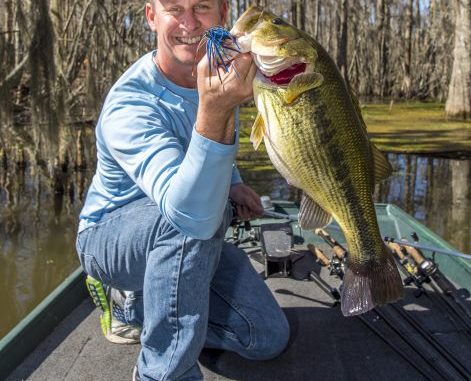
Louisiana law allows landowners to control man-made canals
Facebook exploded in January with rumors that Orange Grove — one of the canal complexes in the Bayou Black area — was being shut off.
Some claimed buddies had received tresspass tickets. Others claimed gates and piles were being placed at Orange Grove’s mouth.
But Prairieville’s David Cavell made a trip to Bayou Black and reported on Facebook that, as of Jan. 29, no such work had begun.
Hoewever, reports that anglers were being told to leave the area continued.
And then word got out that Swamp People’s Troy Landry had gated off Curtis Breaux Canal on the western bank of Lake Verret. Bass anglers went nuts.
Louisiana Sportsman collected photos of the gate, and ownership was confirmed when a Baton Rouge news outlet published a story about Landry offering a reward for information leading to those who damaged the gate.
Most of the discussion about these issues has occurred on the Louisiana Sportsmen United Facebook group, which has more than 1,900 members. Many of those members railed against the blocking off of waters traditionally open to public fishing, while some pointed out that Louisiana state law allows private landowners control of all man-made canals not on public land.
Baton Rouge’s Sean Robbins said he was kicked out of Antille Canal just to the east of Orange Grove last year, so he understands the frutstrations.
“They told me I needed to get out …,” Robbins said. “He told me at that time, ‘This canal is private all the way to the Intracoastal.’”
Robbins is among the anglers looking to protect the right to fish in canals, but it would seem they face an uphill battle because state law falls solidly on landowners’ side of the argument.
That’s because the state Legislature ceded ownership of much of the state’s tidal waters after the U.S. Supreme Court in 1988 ruled in Phillips Petroleum vs. Mississippi that the Magnolia State owned all flowing waters.
Louisiana landowners howled, and legislators essentially gave up any claims to all but those waters shown on maps when the state joined the Union.
Here’s what Act 998, passed in 1992, says:
“Any act by which the state has transferred or hereafter transfers ownership of immovable property which, at the time of the transfer, encompasses inland non-navigable water beds or bottoms within the boundaries of the property transferred, is presumed to convey to the transferee the ownership of the inland non-navigable water bottoms, unless title thereto has been expressly reserved by the state of Louisiana in the act. Nothing contained in this Part shall be construed as conveying to any person title to any lands that have not previously been conveyed or transferred by the state.“
Many anglers look at the navigability test defined in this statute and point out that the canals in question are clearly navigable, but the state does not include man-made canals as part of its waters. Click here to learn what the state claims as public — and discover just how much water is controlled by private landowners.
Robbins said the Lake Verret Bass Club of which he is a member decided something needed to be done because the incidents of being run out of canals was growing.
“That started talk within the club,” he said. “Is it the taxpayers’ fish or the private landowners’ fish?”
So Robbins is working to create an organization to push for legislative action. While that organization has yet to come together, an online petition has been created to build consensus.
All the while, Facebook users have cried foul over landowners’ actions.
But Robbins and Bassmaster Elite Series pro Cliff Crochet, who hails from Pierre Part and cut his teeth fishing many areas in which anglers are either blocked or are being told to leave, agreed that anglers should resist the urge to lash out at landowners.
“There’s a better way to do this,” Robbins said. “If you want to try to do this right, you have to organize and get some legislative reform.”
Crochet agreed, and said he doesn’t hold a grudge against landowners even though he is disappointed areas like Curtis Breaux Canal have been shut off.
“I’m not mad at the landowners: They’re just doing what the law allows them to do,” he said. “You cannot attack people personally. It don’t pay to cuss people because it’s just going to make them mad.
“All it does is make it a hostile environment.”
He said the real problem stems from Legislature, which gave up any claims to the waters connected to bayous and lakes.
“We’re disappointed in the state government,” Crochet said.
Robbins urged anglers to join the Facebook group so they can stay abreast of the situation, including how they can bring pressure to bear on state politicians.
“You have to show there are numbers and numbers and gobs and gobs of recreational anglers who want access to these canals,” he said. “You can make a case that this is going to have a big economic impact on the state.”
Crochet agreed, pointing out that anglers will stop buying boats and outboards if they don’t feel like they have access to productive fishing waters.
“A guy sitting at home is going to say, ‘Why should I get a license and buy a boat if I can’t fish?'” the touring pro said.
While Robbins is working toward building a list of anglers committed to fighting for legislative reform and garner attention from national fishing organizations, he urged anglers to be patient and act responsibly when on the water — and understand that getting cooperation from landowners will be important.
“I’m trying to convince people there is a middle ground,” he said. “There’s going to be compromise on both sides.”
Want to know what waters in your favorite fishing area are considered private? Click here to discover how you can see a map of all state-owned waters.
And be sure to let us know your opinions by commenting below.


